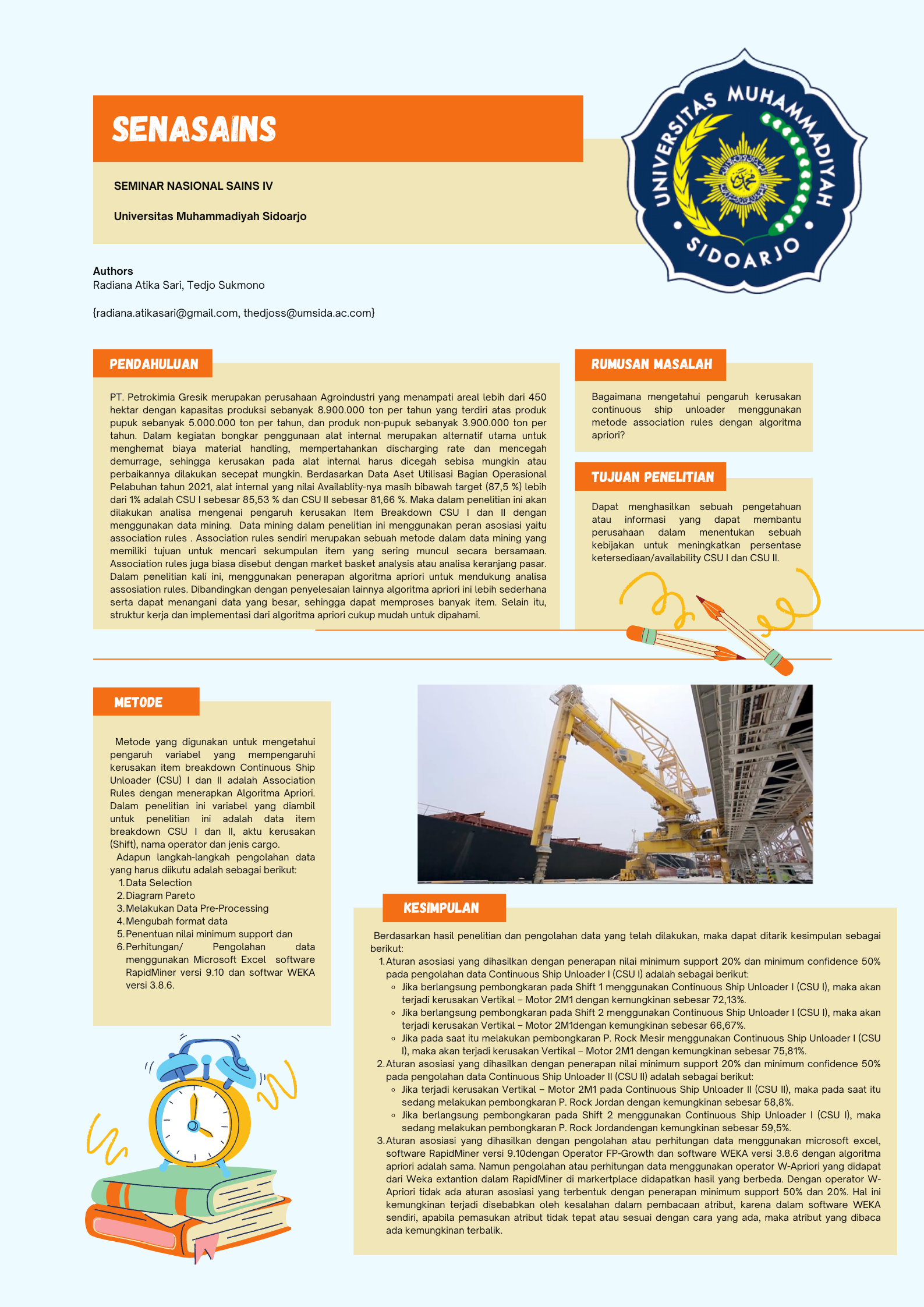Continuous Ship Unloader Availability Analysis Using Association Rules Method with Apriori Algorithm
Analisa Availability Continuous Ship Unloader Menggunakan Metode Association Rules dengan Algoritma Apriori
DOI:
https://doi.org/10.21070/pels.v2i2.1266Keywords:
Apriori Algorithm, Assosiation Rules, Data MiningAbstract
- Petrokimia Gresik is a company engaged in the argo industry. In an effort to increase productivity, PT. Petrokimia Gresik has a special port used for loading and unloading activities. During loading and unloading activities, special equipment is needed to make it easier to move cargo. Not infrequently this equipment suffers damage that is not known what object affects the damage. Based on the 2021 Asset Utilization Data, internal tools whose availability is still below the target of more than 1% are CSU I and 81.66%. The percentage of equipment availability that is below the target causes the process of unloading raw materials to be not optimal and can cause demurrage costs or company fines to the ship if the cause of the damage is not immediately identified and addressed. This study aims to help companies obtain information about objects that affect CSU I and CSU II experiencing breakdowns. The role of data mining that will be used in this research is association rules with a priori algorithms. Data processing is assisted by Microsoft Excel, RapidMiner software and WEKA software. There are no association rules that are formed with the application of a minimum support value of 50% and a minimum value of 50% confidence, both in CSU I and CSU II data processing. The association rules formed by applying a minimum support value of 20% and a minimum confidence value of 50% for CSU I data processing are 3 rules, while the association rules obtained for CSU II data processing are 2 rules. Based on the rules formed in CSU I and CSU II, the breakdown item that is likely to be damaged is Vertical – Motor 2M1.
Downloads
References
Angelia Fani, Santoso dan Kartika Suhada, “Perbaikan Tata Letak Gudang dengan Association Rule Mining dan Dedicated Storage Policy di PD Andika – Indramayu”, Journal of Integrated System., vol. 3, no. 2, pp. 161-179, Desember 2020
Aziz RZ Abdul, Total Quality Manajement: Tahapan Implementasi TQM dan Gugus Kendali Mutu Usaha Mikro Kecil dan Menengah (UMKM)”, Bandar Lampung: Darmajaya (DJ) Press, 2019.
Firdaus Agung Adi, dkk, “Penerapan Algoritma Apriori untuk Prediksi Kebutuhan Suku Cadang Mobil”. Jurnal Sistem dan Teknologi Informasi, vol. 09, no. 1, pp. 13-18, Januari 2021.
Hamdani dan Haikal, Seluk Beluk Perdagangan Ekspor-Impor Jilid 1, Jakarta Timur: Bushindo, 2017.
Marie Iveline Anne, dkk, “Analisis Gangguan Kerusakan Mesin Produksi Menggunakan Teknik Association Rules”, Jurnal Ilmiah Teknik Industri, vol. 7, no. 1, pp. 45-52, Agustus 2019.
Munadi dan Ian Aditama Putra, “Analisis Kegagalan Bantalan Radial pada Traveling Wheels Mesin Ship Loader”, ROTASI, vol. 23, no. 4, pp. 58-65, Oktober 2021.
Siregar Amril Mutoi dan Adam Puspabhuana, Data Mining: Pengolahan Data Menjadi Informasi dengan RapidMiner, Surakarta: CV Kekata Group, 2017.
Wanto Anjar, dkk, Data Mining: Algoritma dan Implementasi, Medan: Yayasan Kita Menulis, 2020.
Wibisono Agustinus Agung Hario, Ade Rahmat Iskandar, dan Atik Febriani, “Implementasi Apriori untuk Menentukan Pola Asosiasi Kerusakan Sparepart”, Journal of Information System, Software Engineering and Applications, vol. 1, no. 2, pp. 82-88, Mei 2019.
Wongwan Kritsada & Wimalin Laosiritaworn, “Application of Association Rules in Woven Wire Mesh Defects Analysis”, 7th International Conference on Industrial Technology and Management. pp. 325-329. 2018.




